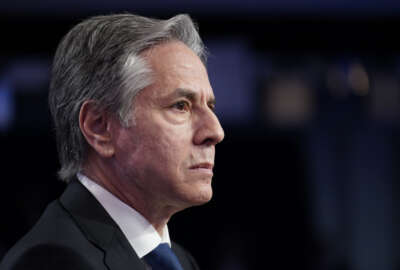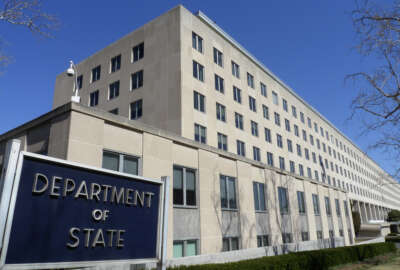
State Dept faces subpoena for confidential records. Diplomats fear chilling effect
House Republicans investigating the rapid U.S. withdrawal from Afghanistan are demanding access to confidential messages from career diplomats to State Department...
House Republicans investigating the rapid U.S. withdrawal from Afghanistan are demanding access to confidential messages from career diplomats to State Department leadership.
Department leaders and a union representing Foreign Service officers, however, say giving Congress access to its “dissent channel” would have a chilling effect on diplomats pushing back on policy decisions.
The House Foreign Affairs Committee issued a subpoena last Thursday to Secretary of State Antony Blinken, demanding the department turn over a dissent channel cable from diplomats wary of a full withdrawal of U.S. military forces from Afghanistan in August 2021. The department had until yesterday to provide those records.
The Wall Street Journal reports that the cable sought by the committee includes messages from diplomats warning that the federal government was not fully prepared for the withdrawal of troops from the country.
Committee Chairman Michael McCaul (R-Texas) said in a statement last week that he issued the subpoena after the department rejected several attempts to “find a middle ground.”
He said he proposed the department redact the names of diplomats who wrote the cable, and offered to review the cable in-person, rather than have the department submit a copy of the cable to the committee.
“We have made multiple good faith attempts to find common ground so we could see this critical piece of information. Unfortunately, Secretary Blinken has refused to provide the dissent cable and his response to the cable, forcing me to issue my first subpoena as chairman of this committee,” McCaul said.
Former committee Chairman Gregory Meeks (D-N.Y.) also requested the cable in August 2021.
The State Department created the dissent channel in 1971 in response to declining morale in the Foreign Service over policy decisions made during the Vietnam War.
American Foreign Service Association President Eric Rubin said in an interview that the dissent channel was created as a forum for diplomats working in a policy area full-time to offer “constructive dissent” to department leadership.
“The idea is to let people say their piece, if they disagree with policy, to keep it classified, to keep it confidential, to have senior officials review what they have to say — and then answer them, usually,” Rubin said.
Foreign Service officers can only use the dissent channel for matters of department policy, not personnel or management issues. Diplomats cannot contribute to the dissent channel anonymously.
AFSA holds an annual award ceremony to recognize diplomats for dissenting in ways that reshaped official department policy.
“It’s not a theoretical exercise, it’s not just blowing off steam. It’s a chance to contribute. But that only works if it’s internal,” Rubin said. “It really is something we consider to be a critical part of the Foreign Service, making it different from other parts of federal service, and we really do believe that sometimes policymakers aren’t getting the best advice.
Rubin said Congress has constitutional responsibilities and authorities to investigate the U.S. withdrawal from Afghanistan, but said the department sharing the dissent channel cables — and the names attached of diplomats signed to that cable — was a “red line” for AFSA.
“People absolutely will not feel they can do it safely, if they think it’s going to be shared with Congress [or] potentially leaked,” he said. “They won’t do it if they’re afraid it could wreck their careers, or that they could be subpoenaed.”
Blinken, in a March 23 hearing, offered to brief the committee on the contents of the dissent channel cable, but said the department had to uphold its decades-long tradition of keeping those communications confidential in order for diplomats to feel comfortable to “speak truth to power as they see it without fear or favor.”
“It is vital to me that we preserve the integrity of that process and of that channel — that we not take any steps that could have a chilling effect on the willingness of others to come forward in the future, to express dissenting views on the policies that are being pursued,” Blinken said.
Rubin said each administration varies in its consideration of the dissent channel. However, he said that the Biden administration has welcomed this feedback from diplomats, and the department modified its policy in response to the dissent of several diplomats recognized at AFSA’s latest award ceremony.
“There have been times when not a lot of use was made of the dissent channel. But there have [also] been times when a lot has been, and right now is such a time,” Rubin said.
Blinken told the committee that he reads and responds to every dissent channel cable that he receives, and that “we factor into our thinking what we hear from colleagues who have a different view.”
Principal Deputy Spokesperson Vedant Patel told reporters last Thursday that the department can provide the committee with the information it’s looking for, while preserving the confidentiality of the dissent channel.
“The department’s concern is much broader than this cable or any single cable; rather, it’s to protect all dissent channel communications past and future to ensure that the channel remains a privileged and confidential vehicle for department personnel or embassy staff to share their candid feedback and advice,” Patel said.
Copyright © 2025 Federal News Network. All rights reserved. This website is not intended for users located within the European Economic Area.
Jory Heckman is a reporter at Federal News Network covering U.S. Postal Service, IRS, big data and technology issues.
Follow @jheckmanWFED
Related Stories




